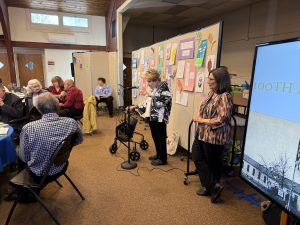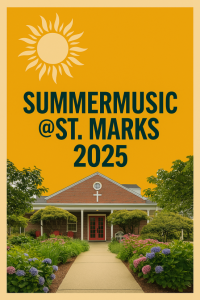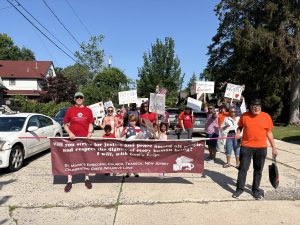Welcome!
1925 – Our 100th Year – 2025
St. Mark’s has been “Celebrating God’s Inclusive Love” since 1925. Our joyful and diverse community meets at the intersection of an ancient faith and modern thought, and we invite seekers, questioners and doubters of any religious background (or none).
ADULT TICKET CHILD TICKET
Worship (In Person and Virtual)
- Sundays
- 8:00 a.m. – Holy Eucharist (Communion) simple, no music, in person only
- 10:00 a.m. – Holy Eucharist (Communion) with music and sermon, in person and on Zoom.
- Healing Prayer is offered during Communion
- Child care for babies/toddlers available during the service*
- Church School runs concurrently with the 10:00 a.m. service during the school year*
- Tuesdays & Thursdays:
- 8:00 p.m. – Compline (Night Prayer) on Zoom
The last prayer of the “Daily Office” these are spoken services of approximately half an hour, with Scripture readings and the opportunity to offer prayers of petition (asking) and thanksgiving. There is no sermon.
- 8:00 p.m. – Compline (Night Prayer) on Zoom
NOTE: Church school and child care resume September 21st.
Unable to join us in real time? St. Mark’s worship services are recorded so you can still participate in the prayers, hear the sermon, and enjoy the music. You’ll find the most recent one here, and we invite you to view our archive of recorded services on our YouTube channel.
Short on time? Here are some sermons from our pulpit:
Events
-
- Thursday, September 11th
- 7:00 p.m. – Compline with 9/11 memorial observance (on Zoom)
- Sunday, September 14th – The Fifteenth Sunday after Pentecost
- 8:00 a.m. – Holy Eucharist (spoken)
- 10:00 a.m. – Holy Eucharist with choir (family service with youth participation)
- 11:30 a.m. – “Start Up Sunday” Potluck Picnic
- Sunday, September 21st – The Sixteenth Sunday after Pentecost
- 8:00 a.m. – Holy Eucharist (spoken)
- 10:00 a.m. – Holy Eucharist (commissioning of church school)
- Tuesday, September 23rd – The Feast of St. Matthew the Apostle (transferred)
- 6:00 p.m. – Evening Prayer
- Saturday, October 18th
7:00 p.m. – Biannual Caribbean Night dinner dance - Sunday, November 1st- THE FEAST OF ALL SAINTS
4:30 p.m. – Encore a retrospective concert by our choir - Sunday, November 23rd – The Feast of Christ the King
10:00 a.m. – Episcopal visit by the Rt. Rev. Carlye J. Hughes, Bishop of Newark
- Thursday, September 11th
Here’s What’s Happening
 Embracing Neurodiversity: Jewels Quelly’s presentation on the BOOST Task Force - Diocesan tasks force uplifts neurodiverse people and their caregivers …
Embracing Neurodiversity: Jewels Quelly’s presentation on the BOOST Task Force - Diocesan tasks force uplifts neurodiverse people and their caregivers …Embracing Neurodiversity: Jewels Quelly’s presentation on the BOOST Task Force Read More »
 Speakeasy Party Sizzles our Centennial Summer - Prohibition-era dance party featured music, beverages and costumes from the year of our birth …
Speakeasy Party Sizzles our Centennial Summer - Prohibition-era dance party featured music, beverages and costumes from the year of our birth … Summer Sunday Conversations - St. Mark's is pleased to bring back Summer Sunday Conversations. This series of conversational forums held after the service offer the opportunity to learn about some of the causes and organizations about which our parishioners are passionate. July 13 – Family Promise of Bergen County Paul Shackford, President of the Board… …
Summer Sunday Conversations - St. Mark's is pleased to bring back Summer Sunday Conversations. This series of conversational forums held after the service offer the opportunity to learn about some of the causes and organizations about which our parishioners are passionate. July 13 – Family Promise of Bergen County Paul Shackford, President of the Board… … St. Mark’s Again Plans a Summer of Musical Guests - Our choir may have hung up their robes for the summer, but there will be no lack of music at worship during the warm months! St. Mark's is pleased to announce a slate of guest and featured performers to add variety and vitality to our services: July 6 Angela Rodao,… …
St. Mark’s Again Plans a Summer of Musical Guests - Our choir may have hung up their robes for the summer, but there will be no lack of music at worship during the warm months! St. Mark's is pleased to announce a slate of guest and featured performers to add variety and vitality to our services: July 6 Angela Rodao,… …St. Mark’s Again Plans a Summer of Musical Guests Read More »
Episcopal News Service The official news service of the Episcopal Church.
- Employment ends for general secretary of Anglican Church of Canada’s General Synodby Melodie Woerman on September 8, 2025
[Anglican Church of Canada] Archdeacon Alan Perry is no longer the general secretary of General Synod, per a press release posted on anglican.ca Sept. 3. The release does not specify a reason for the ending of his employment in the role. It states that he is a priest of the Anglican Church of Canada in good standing, and it wishes him well in his future undertakings. General Synod will soon begin the process of recruiting a new general secretary, it adds. Henrieta Paukov, director of […]
- Church of England’s safeguarding director says listening is at the heart of his workby Melodie Woerman on September 8, 2025
[Church of England] The Church of England’s safeguarding director, Alex Kubeyinje, has reflected on the church’s safeguarding work, the importance of listening to victims and survivors, and his own leadership during a wide-ranging conversation with the Social Work Unfiltered podcast. Kubeyinje’s career began in social work, shaped by growing up in a deprived area where many had limited opportunity. He recounts how his early experiences gave him a strong sense of purpose and a deep […]
- Robert Price consecrated as Dallas’ bishop coadjutorby Melodie Woerman on September 8, 2025
[Episcopal News Service] Robert P. Price was consecrated bishop coadjutor of the Episcopal Diocese of Dallas on Sept. 6 in a service at the Church of the Incarnation in Dallas, Texas. Price was serving as dean of St. Matthew’s Cathedral in Dallas when he was elected on the second ballot on May 3. Presiding Bishop Sean Rowe was the chief consecrator for the service, and the preacher was Tennessee Bishop John Bauerschmidt. The diocese said in advance of the service that more than 30 bishops […]
- Episcopal St. Paul’s Within the Walls opens its doors to LGBTQ+ Catholic pilgrims in Romeby lwilson on September 8, 2025
[Episcopal News Service – Rome, Italy] Marianne Duddy-Burke rested in the shade outside St. Paul’s Within the Walls on Sept. 6 after a historic day for LGBTQ+ Catholics. Twenty-five years earlier, Duddy-Burke, the executive director of the Catholic full-inclusion organization DignityUSA, had traveled to Rome for Holy Year, or jubilee, a once-every-25-years time of spiritual renewal, reconciliation and forgiveness for Roman Catholics. Back then, as she and members of her group tried to […]
- Fort Worth church purchases property for new home 4 years after eviction by ACNAby David Paulsen on September 8, 2025
[Episcopal News Service] A prominent Episcopal congregation in Fort Worth, Texas, that was forced out of its church building and rectory in 2021 over a property dispute with a group of breakaway Anglicans, is celebrating a new permanent home. All Saints’ Episcopal Church held a groundbreaking ceremony Sept. 7 at the church property that it purchased from a United Methodist congregation at 6036 Locke Ave. The Methodist congregation had merged with another church and now is worshipping at […]
- Seminary of the Southwest ‘immediately’ terminates Scott Bader-Saye as president and deanby Shireen Korkzan on September 5, 2025
[Episcopal News Service] The Board of Seminary of the Southwest yesterday terminated President and Dean Scott Bader-Saye “effective immediately,” according to a Sept. 5 letter to alumni and friends from the Diocese of Texas. Bader-Saye’s termination comes after he admitted to developing an inappropriate relationship with an employee he had supervised, according to the letter signed by Texas Bishop Suffragan Kathryn M. Ryan, who chairs the Austin-based seminary’s board of trustees, and […]



